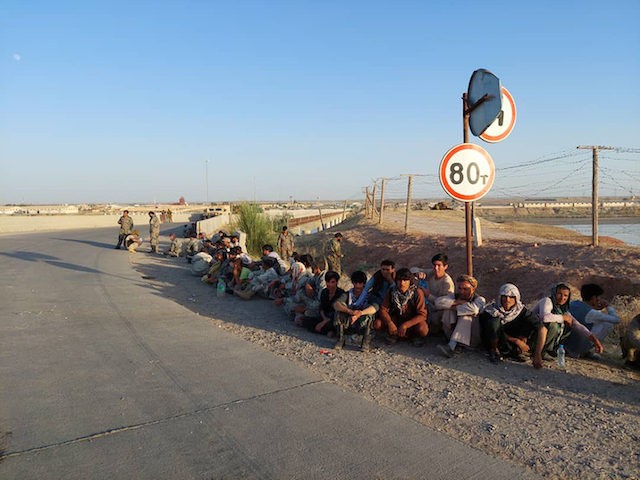Tajikistan asked the Collective Security Treaty Organization (CSTO) — a Russian-led military alliance of former Soviet republics — for help in securing its border with Afghanistan on Wednesday, citing advances by the Taliban terror group following a Western troop withdrawal from Kabul.
“Tajikistan, as the country with the longest border with Afghanistan, is taking all possible measures to maintain the situation, to meet the threats and challenges coming from that country,” Hasan Sultanov, the Permanent Representative of Tajikistan to the CSTO, said at a meeting of the CSTO Permanent Council on July 7.
“However, given the situation in the region, as well as the fact that certain parts of the border with Afghanistan are in hard-to-reach mountainous areas, it becomes difficult to overcome this problem alone,” Sultanov said, as quoted by Armenia’s state-run news agency Armenpress.
Sultanov said Tajikistan’s border situation requires “an adequate response by the CSTO, including the adoption of measures for strengthening the potential to protect the southern borders.”
“In this context, the implementation of 2013, September decision of the Collective Security Council on the need to ‘Provide Assistance to the Republic of Tajikistan in strengthening the Tajik-Afghan border’ remains relevant [sic],” he said.
“Therefore, we would like to call on the member states of the organization to contribute to the full implementation of this document,” Sultanov concluded.
“Tajik authorities say that two-thirds of the 1,357-kilometer border with Afghanistan is under Taliban control and they are preparing for an influx of refugees to enter the country. They say they are already providing Afghan refugees with food and shelter,” Radio Free Europe/Radio Liberty (RFE/RL) reported on July 7.
Russian Foreign Minister Sergei Lavrov responded to Tajikistan’s appeal for military aid on Thursday, saying the Russian Armed Forces would “honor our commitments” to the CSTO “if Tajikistan is attacked.”
“If Tajikistan is attacked, this will, of course, be a subject of an immediate discussion in the CSTO,” Lavrov told reporters while visiting Russia’s Far Eastern Federal University on July 7.
“Moscow and Dushanbe are allies under the Collective Security Treaty, and Russia has a military base in Tajikistan,” Lavrov noted, according to the Russian state-owned news agency TASS.
“So, we will, of course, honor our commitments,” he added.
Russian President Vladimir Putin spoke with Tajikistan President Emomali Rakhmon on July 5 and assured him that Russia would provide “all necessary support” to Tajikistan as the impoverished ex-Soviet state confronts the growing security threat from Afghanistan.
“The parties had a detailed discussion on the complex situation on the Tajik-Afghan border prompted by the escalation of armed confrontation in Afghanistan, including in the border zone,” the Kremlin wrote in a press statement confirming the phone call between Putin and Rakhmon on July 5.
“Vladimir Putin reaffirmed determination to provide all necessary support to Tajikistan, both bilaterally and within the framework of the Collective Security Treaty Organization [CSTO],” the statement read.
Russia’s Interfax News Agency reported on July 5:
Fighting in the northern part of Afghanistan prompted over 1,000 Afghan government troops retreat to Tajikistan under pressure of Taliban (banned in Russia) militants in the early hours of July 5, after over 300 Afghan troops had retreated to Tajik territory on Saturday [July 3] and 94 others on Sunday evening [July 4].
“Rahmon has instructed the [Tajik] Defense Ministry to mobilize 20,000 reservists to reinforce the Tajik-Afghan border,” the Tajik presidential press service reported on July 5, according to Interfax.
The U.S. is currently leading a withdrawal of Western troops from Afghanistan following a 20-year joint military operation in the country by the U.S. and allied members of the North Atlantic Treaty Organization (N.A.T.O.). The U.S. troop pullout is more than 90 percent complete but is scheduled to finish by September. Afghanistan’s Taliban terror group has already filled much of the void left by the Western military alliance’s exit, with Taliban terrorists reportedly overtaking much of Afghanistan’s formerly U.S.-protected territory in recent days.
“In the last week, the Taliban have overrun areas [of Afghanistan] bordering five countries — Iran, Tajikistan, Turkmenistan, China and Pakistan,” Reuters reported on July 8.
“Taliban fighters seized control on Thursday [July 8] of a key district in western Afghanistan that includes a major border crossing with Iran,” the news agency revealed, citing information from security officials within Afghanistan’s internationally recognized government based in Kabul.

COMMENTS
Please let us know if you're having issues with commenting.